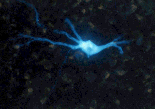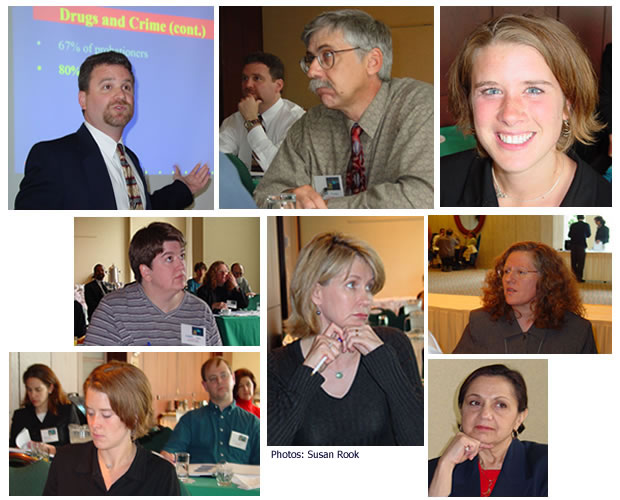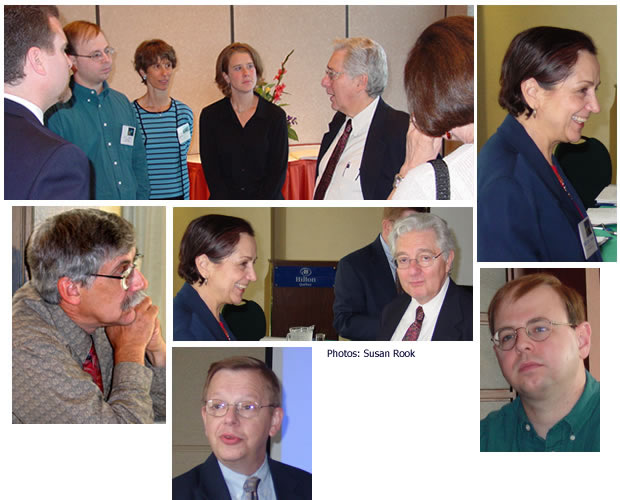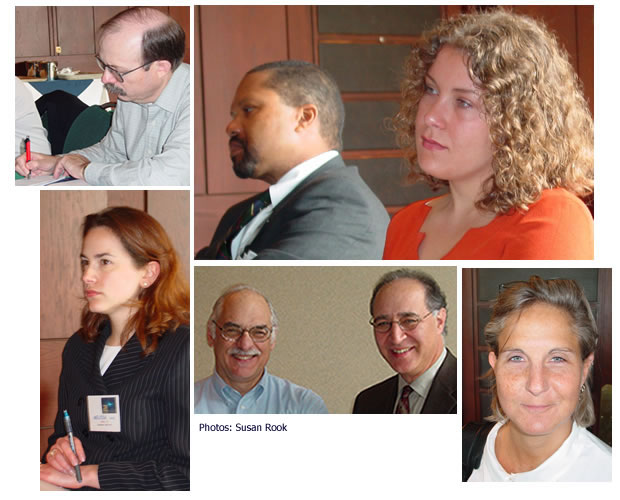

|
|||
|
|
|||
 |
|||
Participants What Journalists Said Faculty Syllabus |
|||
|
|||
| June 2002 Workshop Participants | |||
|
Lori
Hines J.J.
Boehm Nellie
Kelly John
Craig Melissa
Long |
Katie
Matvias Donna
Hamilton Graciela
Rogerio John
Trumbo Cindy
West |
||
 |
|||
What Journalists Said About the June 2002 Workshop |
|||
“I want to thank you so much for including me in your addiction studies program. I arrived back at work this morning re-energized about the kind of stories I can do now. I am proposing to my boss that I write a three-part series on our Health/Science page so I can explain to the readers about how addiction starts and the science behind it. I'm really excited about it.” “What a great conference! Please pass my appreciation on to all the faculty.” “Thanks for the conference. Upon my return, I had a fax about a speaker who will be talking here about drug and alcohol-addicted babies and the impacts of their mothers' addictions. So, the conference couldn't have been more timely.” “Thank you all for allowing me to attend. I learned so much and came back so refreshed because of meeting such interesting people, learning so much about addiction, and spending time in a city I might have never visited otherwise.” “I had a great
time and learned a lot.”“Thanks for the opportunity to attend
a very worthwhile conference in a delightful location.” “Now I can explain the why of addiction better and put it into historical context. Plus I am always looking for more resources so thank you for that.” “I now know and understand how challenging it can be to ‘kick a habit.’ I’ve never been addicted to drugs, let alone tried them, and I really don’t drink often, so this program has been eye-opening. Thank you.” “I leave with a much better understanding of the brain chemistry involved in drug abuse, as well as the brain and how it works in general.” “I think I will
try to do a better job at explaining why addiction happens – what
happens to your brain – and my research will be better.” “It was a great program.” |
“The program’s given me ideas for new questions I can ask. The questions will put both drug users and policy makers on the spot for better explanations.” I’m more sympathetic to the struggle to beat addiction. “I know this was mentioned - include judges, prosecutors, politicians, policy makers. Those people need to be here.” “As I encounter addiction subject matter, I will have the basic scientific understanding to fairly present addiction as more than mere ‘bad choices.’” “I am planning a series on drug addiction. Now I can explain how addiction affects the brain. I have a good, scientific explanation of why addicts can’t just quit.” “I have more facts and resources at my disposal. If I didn’t incorporate them in future stories, that would be unethical.” “The program made me much more understanding of drug abusers and how difficult recovery can be.” “I did know a lot about addiction, but it changed my view based on the scientific info and how it becomes a disease once you’ve voluntarily taken drugs. I didn’t understand that before. I also didn’t know about what changes happen in the brain.” “All I knew about drugs’ affect on the brain was the “killing” of brain cells and I thought quitting was a matter of will power and being ready to quit.” “I liked learning how addiction works in the brain.” “Great information
- the scientific angle and neurobiology angles were extremely interesting.
Also liked treatments on horizon.” “Overall, just
a thank you!” |
||
 |
|||
June 2002 Workshop Faculty |
|||
|
David Friedman, Ph.D. Director, Addiction Studies Program for Journalists Director, Center for the Integration of Substance Abuse Research Department of Physiology and Pharmacology Wake Forest University School of Medicine Winston-Salem, North Carolina Sue
Rusche Martin
W. Adler, Ph.D. Douglas
B. Marlowe, J.D., Ph.D. Wallace
Pickworth, Ph.D. |
Susan Rook Editor, The Next Step Public Affairs Director Step One, Inc. Winston-Salem, North Carolina Rochelle
“Shelly” Schwartz-Bloom, Ph.D. Jack
Strandhoy, Ph.D. Kent
E. Vrana, Ph.D. Mark
Wright Marilyn
Yates |
||
| June 2002 Workshop Syllabus |
|||
Friday, June 7, 2002 9:00 Introduction 9:15 Animal Models of
Addiction 9:30 Shaping the Discussion 10:00 A History of Addiction
in America 11:00 Break 11:15 The Neurobiology
of Addiction 1:00 Lunch 2:00 The Pharmacology
of Addiction 3:45 Break 4:00 Scientifically
Reliable Web Sources 5:00 Adjourn 6:00 Reception 6:45 Dinner |
Saturday, June 8, 2002 8:45 Reviewing the Discussion 9:00 Principles of Addiction
Treatment 10:45 Break 11:00 Treatment Medications:
Current and Promising 12:45 Lunch 2:00 Effective Strategies
for Drug-Abusing Offenders 3:30 Break 3:45 How Can CPDD Help
Journalists, 4:30 Evaluations 5:00 Adjourn |
||
| Home | Register | Future Workshops | Past Workshops | Addiction Stories | Science Update | Links | Glossary | About |
Last Revision
info@addictionstudies.org